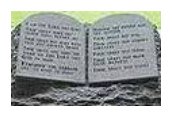4th Commandment
Bible Study Lesson 5.04
The 4th Commandment Bible Verses:
God spoke all these words, saying, "Remember the Sabbath day, to keep it holy. You shall labor six days, and do all your work, but the seventh day is a Sabbath to the Lord your God. You shall not do any work in it, you, nor your son, nor your daughter, your male servant, nor your female servant, nor your livestock, nor the stranger who is within your gates; for in six days the Lord made heaven and earth, the sea, and all that is in them, and rested the seventh day; therefore the Lord blessed the Sabbath day, and made it holy." Exodus 20:1,8-11 NHEB.
Previous Bible study lessons: 3rd Commandment #5.03.
Preliminary Bible Study Questions:
1) Why does the Fourth Commandment exist?
2) Are Christians obligated to follow the Fourth Commandment?
3) How does a Christian honor the 4th Commandment?
Do you enjoy chilling out on Saturdays and/or Sundays?
Have you ever wondered why?
There's a reason for the natural tendency to want to laze around on the weekend.
It's been built into the human creature by God, the Creator. The human body requires rest after work.
Following the fourth commandment results in the blessings of physical and mental rest and spiritual renewal. Good things, of course, but this study goes much broader and deeper than the obvious results of physically observing the Jewish Sabbath.
We'll discuss the who's, what's, when's, and where's of the fourth commandment because, after all, it's a commandment written by the very hand of God, and the Law is always good (1 Corinthians 9:21).
The 4th Commandment
God wanted his chosen people to relax from work, focusing upon Him, on one designated day each week. He commanded that the Israelites keep that particular day holy, refraining from work, and thus the 4th Commandment was born.

Why does the Fourth Commandment exist? The genesis of this commandment is found in the book of Genesis, believe it or not.
The model was set in place by God himself, "The heavens and the earth were finished, and all their vast array. On the seventh day God finished his work which he had made; and he rested on the seventh day from all his work which he had made. God blessed the seventh day, and made it holy, because he rested in it from all his work which he had created and made" Genesis 2:1-3 NHEB.
God had just finished creating the entire universe, including the earth and all the things and all the life on the earth. A literal six days it had taken him to complete the entire, massive project (Genesis 1:4-5). He admired his "very good" creation in its entirety while resting for one day, the 7th day, known as the Sabbath day (Genesis 1:31).
The term "Sabbath" actually means "to rest."
God then sanctified the seventh day, marking it holy, a day set apart from the other six days. He rested after the work of creation ex nihilio, i.e. out of nothing. God created ALL things, both visible and invisible, out of nothing. God planned the universe (Job 38:4,33; Ephesians 1:4-5), his Son spoke it (Genesis 1:3), the Spirit and the Son formed it into existence (Genesis 1:2; John 1:1-4), and the Son still today holds it all together (Colossians 1:15-17).
What Day Is the Sabbath?

God commanded the Israelites to follow his lead. He wanted them refraining from work on the 7th day of every week, so they could admire his awesome power and heavenly majesty.
The Hebrews' duty to the 4th Commandment sounds quite simple at this point, doesn't it? They were supposed to take one restful day per week, stay in their home (Exodus 16:29) and reflect upon God and his great work of creation (Exodus 16:23). Awhile later, God commanded that a holy assembly meet on the Sabbath day, as well (Leviticus 23:3).
This commandment was a welcomed law to them (Exodus 16:29), because they never received a weekly day of rest during the 400 year slavery to the Egyptians. In fact, this was a unique law in the region since no neighboring countries enjoyed a day of rest. As you can imagine, non-stop work would also severely limit one's spiritual life.
The Sabbath day was observed by the Hebrews from Friday evening at 6pm until ending at 6pm on Saturday.
The Old Covenant Observance
The 4th Commandment was extremely important in the Old Covenant, which is proven by the rules and punishments that grew out of this law.
For starters, there was no work allowed on the Sabbath (Leviticus 23:3; Jeremiah 17:21-22). Specifically, traveling farther than 1000 feet from one's house was forbidden (Exodus 16:29). Buying and selling, of any sort, were forbidden (Amos 8:5), as was marketing (Nehemiah 10:31). A Hebrew was to give twice as much offering on the Sabbath as the other days (Numbers 28:9). If a person did happen to work on the Sabbath he would face capital punishment (Exodus 31:14). You heard that correctly - capital punishment.
A Sabbath lawbreaker, such as someone who chose to pick up sticks, was commanded by God and Moses to be killed (Numbers 15:32-36). Starting a fire inside a home, such as for warmth or cooking, was totally forbidden and punishable by death (Exodus 35:2-3).
The tradition of the elders, aka The Mishnah, also expanded the Jewish regulations for the fourth commandment. For instance, forbidden were the scraping or sanding of a surface to achieve smoothness; cleaning and preparing a surface to render it suitable for writing; writing or forming a meaningful character or design; and preserving any item to prevent spoiling. There are 39 categories, with many more details involved in each one. These laws were built with the Sabbath's creation roots in mind, meaning that creative "works" were forbidden.
There was also a Sabbath year observed every 7th year, which had separate laws of its own, i.e. debts were canceled and the land rested from production for profit.
The Old Covenant believers worshiped at the Temple, and strictly lived according to God's Law, aka Moses' Law. The obedience didn't make them holy, because they were sinners by nature, but the true believers' hearts desired to do the best they could to follow the laws. The priestly sacrifices covered their sins.
God's chosen nation, Israel, had the priestly sacrifice system in place to temporarily and symbolically atone for the sins of the people (ex. Exodus 29:36;44-46). But the Messiah would someday come and sacrifice himself once and for all time for the true, faithful Jewish believers (Hebrews 10:11-12; 1 Peter 1:18-20).
The unbelieving Jews were punished severely by the Lord. God forbid them from ever entering his place of rest, i.e. the Promised Land (Psalm 95:10-11). The Promised Land was a type of heaven, pointing to the real heaven. In other words, the Promised Land pointed towards the eternal place of Sabbath rest, which is found in God's home - Heaven.
The ultimate Sabbath is heaven and unbelievers aren't allowed to enter (Hebrews 4:1-2). The New Covenant actually allows believers, including Messianic Jews, to enter the Sabbath rest by faith! (Hebrews 4:3). Hebrews chapter four is worth a closer look, because it reveals the mystery of the Sabbath.
The New Covenant Sabbath
The Jewish author of Hebrews 4:4-5 explains that heaven is the eternal place of rest for God and all believers. People who aren't real believers will never enter. He tells us in Hebrews 4:6, "So, God's rest is there for people to enter."
He says in Hebrews 4:7, "So God set another time for entering his rest, and that time is today." This means that by trusting in the work of Christ, you can rest from your feeble attempts to please God.
Hebrews 4:9-10 tells us there is a "Special rest still waiting for the people of God. For all who have entered into God's rest have rested from their labors, just as God did after creating the world." You see, the 4th Commandment is built upon God's creative works. His ultimate work of creation is heaven itself. It is waiting for us to enter by faith in Christ.
Believing in Jesus Christ fulfills the New Covenant version of the Fourth Commandment.
Finally, this enlightening passage warns us, "So let us do our best to enter that rest. But if we disobey God, as the people of Israel did, we will fall" (Hebrews 4:11). The reason we can enter God's Sabbath is because of none other than Jesus Christ.
Thankfully, Jesus came and perfectly observed the 4th Commandment
exactly the way God intended. He fulfilled and completed the human
physical and spiritual requirements for this holy law. Please read that critical
statement again and let it sink deep into your heart.

The Pharisees, though, constantly accused Jesus of breaking the Sabbath laws, but that was only by their Mishnah, aka "tradition of the elders." These rules were human-inspired. The spiritual element was not behind their teaching; therefore, their "laws" went unrecognized by Jesus. Jesus held to the strict spiritual interpretation of the Hebrew Scriptures, aka Old Testament.
In the midst of Jesus' tirade against the hypocrisy of the Pharisees and scribes, Matthew 23:4 states, "For
they bind heavy burdens that are grievous to be borne, and lay them on
men's shoulders; but they themselves will not lift a finger to help
them."
Finally, notice how Jesus separates human interpretation from the inspired word of God, "He said to them, "Well
did Isaiah prophesy of you hypocrites, as it is written, 'These people
honor me with their lips, but their hearts are far from me. But in vain
do they worship me, teaching as doctrines the commandments of men.' For
you set aside the commandment of God, and hold tightly to the tradition
of men" Mark 7:6-8.
Know that faithless people create
strict moral codes and abide by them. They attempt to gain God's favor
through their efforts. The scribes and Pharisees did this very thing
because they lacked pure, saving faith in God alone.
Contrary to
man's commandments, God's commandments aren't burdensome. They're able
to be kept by people with faith in God and his Son, the Messiah. Jesus
said, "Come to me, all you who labor and are heavily burdened, and I
will give you rest. Take my yoke upon you, and learn from me, for I am
gentle and humble in heart; and you will find rest for your souls. For
my yoke is easy, and my burden is light" Matthew 11:28-30. Beautiful.

Incredibly, in the very next verse of God's Word, Matthew notes this circumstance, "At that time, Jesus went on the Sabbath day through the grain fields. His disciples were hungry and began to pluck heads of grain and to eat" (Matthew 12:1). This activity by Jesus and his disciples was blatant disregard for the tradition of the elders, aka the Mishnah. The Pharisees were shocked and accusatory, but Jesus calmly led them to the word he fully regarded, the Hebrew Scriptures (Matthew 12:2-8).
Jesus called his disciples innocent, and gave reasons by quoting Hosea 6:6, "I want you to show mercy, not offer sacrifices;" and adding that he himself is Lord of all, even Lord of the Sabbath. Not stopping there, Jesus immediately walked to the Pharisees' synagogue and healed a man on the Sabbath (Matthew 12:9-13).
Jesus' point being that God's law brings mercy to people, while man's law is merciless and hypocritical. The Pharisees wanted to kill Jesus at this point in time (Matthew 12:14).
Christians, please be aware that the laws you personally manufacture aren't God's word. Go right ahead and glorify God by upholding your own laws, but do not insist that others abide by them. Do not judge others by your extra-biblical rules (1 Corinthians 4:5). By mastering this concept you'll avoid much of your personal hypocrisy. This type of non-judgmental, merciful life pleases God, while attracting sinners to the Kingdom.
Jesus brought with him no new Sabbath day laws. He did not reinstitute the 4th Commandment for his New Covenant Church. Nor are there punishments mentioned for breaking the Sabbath by Jesus, Paul, John, Peter, or any other Scripture writing apostles of Jesus Christ.

The Sabbath day commandment is not a moral law like the other Ten
Commandments. This means that the 4th commandment doesn't contain
forbidden activities that are also forbidden on the other six days. The
fourth commandment is a ceremonial law in the Old Covenant; and, like
the Passover and Festival of Booths, is unneeded in the New Covenant.
The Sabbath Day's physical requirement use has come and gone.
The
Israelites needed a physical law which instructed them to "remember"
the creative works of God, and also his powers of deliverance, which he
displayed in bringing them out of Egypt (Exodus 20:1-2). The Hebrew
believers weren't gifted with the indwelling presence of the Holy
Spirit, and therefore needed a rule governing their thoughts of God.
Finally,
there is nothing forbidding you from the practice of devoting one day
of the week entirely to God. If you do hold to this particular
commandment, you must also hold to the punishment of death when you, or
anyone under your authority, violate the terms. You can't institute and follow a law apart from its punishment, or it would have zero effect. There is no place in Scripture that removes the punishment from the strict observance of the 4th commandment.
I'm wishing you the best if you do instill the Jewish 4th commandment into your life - you'll need it.
Is the Sabbath Now the Lord's Day?
Many Christians believe that Judaism's Sabbath Saturday somehow morphed into Christianity's Sabbath Sunday. There is so much confusion in regards to this issue. Let's stop the confusion now.

Nowhere in the New Testament is any such thing taught or alluded to in any regard.
The New Testament does not call for Christians to observe a Sabbath day, and offers no punishments for breaking any type of Sabbath day, week, or year. In fact, we are to judge no one concerning a Sabbath day (Colossians 2:16-17). The 4th Commandment was a "type" for what lie ahead in Jesus' fulfillment of the Old Covenant law and the New Covenant spiritual laws. Let's find out why.
Physical, outward obedience to God's law was required to fulfill the Mosaic Covenant (Exodus 19:5-6). Unfortunately, no one could sustain perfect obedience to God's law. Jesus did obey the 4th Commandment, however, for the Old Covenant's true Jews (Hebrews 9:15), and for us (the Hebrews and Gentiles who have since become true Christians) (Hebrews 9:14).
Practicing Jews still are under the yoke of the 613 laws of the Old Covenant, which includes the 10 Commandments (Leviticus 16:31). Thinking they can please and appease God through their observance of the laws, they must uphold the 4th commandment.
Obeying God's full law is exactly what they'll be judged upon, as well (Romans 2:12; John 5:45-47). That's a terribly hopeless endeavor for practicing Jews (2 Corinthians 3:15). An Orthodox Jew lacking belief in the Messiah will never enter God's eternal Sabbath (John 15:23; Hebrews 3:19). Today's Jews need their Messiah, and indeed, he HAS COME (1 John 2:2). Watch this report from the most respected of all recent rabbis:
Finally, Christians worship God and his Son on the Lord's Day, which is not a Sabbath, and really has nothing to do with the Sabbath. First Corinthians 16:1-2, Acts 20:7, and Revelation 1:10 are a few of the verses that reveal the New Covenant's corporate observance to Christ's atoning work (Hebrews 10:25). Sunday Christian worship is based on Pentecost and Resurrection Day, which both fell on a Sunday.
How Do I Honor the 4th Commandment?

How can we honor the fourth commandment? Great question! Now, we're getting somewhere! Honoring the intent of the holy 4th commandment is the right attitude, and God's word does give us answers.
Fruit of the Spirit Response to the 4th Commandment.
Believers in God now have God's indwelling Holy Spirit. The Spirit of Christ inhabits our minds and he fills our souls. The Spirit speaks to us constantly. He does this by revealing the Bible to us and increasing our understanding of God and his ways (2 Corinthians 3:16-18). Loving God means that we are always thinking of him, and considering his ways in our day-to-day decisions and actions.
If you're not experiencing this mysterious, but very real, relationship with God, please pay attention. God, in this New Covenant period, now possesses the heart of his true believers. Christians are possessed by God, and therefore think of him nearly all the time. We "remember" God's creation power and his delivering power throughout each and every day.
Listen to how Paul explains the phenomenon, "If then you were raised together with Christ, seek the things that are above, where Christ is, seated on the right hand of God. Set your mind on the things that are above, not on the things that are on the earth" (Colossians 3:1-2). These are instructions by God, through Paul, to always consider God's amazing ways. The Spirit of Christ empowers us to always think of God.
Remembering God's Sabbath is now done internally through our reflections on his word and saving power.

The Sabbath day remembrance has now turned into a Sabbath lifestyle! We are allowed to come to God through Christ, and subsequently stop striving to earn salvation through our efforts. We can "spiritually" rest in Christ and his works, because he fulfilled the requirements of the Law, including the strict observance of the Sabbath.
Jesus appeased the Father's wrath for our sins and failures. Accept Christ's work! Then reflect upon that work! That is how you honor the Sabbath day. Rejoice in Him.
Further,
a Christian practices the Sabbath's intent when he prays, and reads,
studies, meditates, and applies God's word to his life. In other words,
practicing daily spiritual disciplines honors God's 4th Commandment.
Attending church, and practicing good and merciful deeds on a daily
basis, are other ways to honor the original intent of the Sabbath.
If
you cannot place God as the number one priority in your thought life,
then you're misled concerning the strength of your spiritual life
(Romans 8:6). You may even lack true salvation. You should repent and
accept Jesus Christ and his Spirit, on their terms this time, not your
own.
Grasp This!
We are commanded to be perfect, because God our Father is perfect (Matthew 5:48).
Newsflash!
We cannot be perfect by our own striving, working, obeying, and
worshiping God. We fall short, woefully short, because we're wholly
sinful and spiritually dead creatures (Ephesians 2:1-3). Even after God
blesses us with spiritual life and renewal, we continue to falter in our
attempts to satisfy his demands of perfection for us (Romans 7:14;
21-25).

Attempting to please God by our own power and efforts is hopeless. There is great news for you, though (Romans 8:1-4); because Jesus did please and appease God, and YOU can share in his accomplishment.
Jesus' perfect life can be applied to your life, by God alone. It's called imputation (2 Corinthians 5:16-21).
"Yes, the old requirement about the priesthood was set aside because it was weak and useless. For the law never made anything perfect. But now we have confidence in a better hope, through which we draw near to God" (Hebrews 7:18-19 NLT).
"Because of this oath, Jesus is the one who guarantees this better covenant with God... But because Jesus lives forever, his priesthood lasts forever. Therefore he is able, once and forever, to save those who come to God through him. He lives forever to intercede with God on their behalf. He is the kind of high priest we need because he is holy and blameless, unstained by sin. He has been set apart from sinners and has been given the highest place of honor in heaven" (Hebrews 7:22,24-26 NLT).
Draw near to God, and seek the eternal Sabbath of Jesus, whose burden is light. Good works towards other people will spring from your joyful heart, which ultimately satisfy God (Romans 7:6). Eternal life will be your future, as well, allowing you to enter the eternal Sabbath of Christ (Romans 8:10; Hebrews 4:9-11).
Join the next Bible study lesson: 5th Commandment #5.05 or What Are The Ten Commandments?
Fourth Commandment Bible Study Questions:
1) Why are Sabbatarian Christian organizations, such as Seventh Day Adventists, out of line in regards to the fourth commandment?
2) Some Christian theologians separate the Ten Commandments from the other Old Covenant Laws of Moses. Why is this a mistake?
3) Explain the reasoning behind the idea that the 4th commandment is ceremonial and not moral.
More 4th Commandment Bible Verses:
Therefore, my brothers, you also were made dead to the Law through the body of Christ, that you would be joined to another, to him who was raised from the dead, that we might bring forth fruit to God. For when we were in the flesh, the sinful passions which were through the Law, worked in our members to bring forth fruit to death. But now we have been discharged from the law, having died to that in which we were held; so that we serve in newness of the Spirit, and not in oldness of the letter. Romans 7:4-6.
Faith Quotes: 4th Commandment
The external observance of the Sabbath rest is a Jewish ceremonial ordinance and no longer binding on Christians. Sabbatarians surpass the Jews three times over in a crass and carnal Sabbatarian superstition.
-John Calvin
If Sunday were anywhere made holy merely for the day's sake or its observance set on a Jewish foundation, then I order you to walk on it, to ride on it, to dance on it, to feast on it, to do anything that shall remove this encroachment on Christian liberty.
-Martin Luther
The 4th Commandment Prayer:
O, Lord God, You are the Creator of all, and in all. I lift your Name on High!! Thank you, Lord, for giving me life, so I can enjoy You and your beautiful creation. You are magnificent! Father, without Jesus I'm hopeless and lost forever, separated from you and your glory. O, God, thank you, thank you for Jesus, my Great High Priest forever. The One who takes away my sin forever. I praise Him. I look forward to entering the amazing Rest, so I can be with Jesus forever and ever. In the meantime, please help me do good and merciful works, so others can join your blessed family. In Jesus' Name, Amen.
Share on Facebook below and click for your Free Printable Bible Study Lesson: 4th Commandment #5.04.
Click for a free printable List of the Ten Commandments. Please consider a small Donation.
Special Note: I'm grateful to Big Book Media & Free Bible Images, stock.xchng, Morgue Files, and Stock Photos For Free for the use of their photos for the 4th Commandment Bible Study Lesson.
